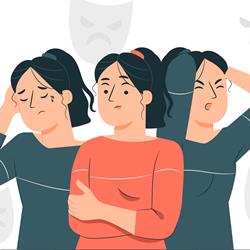In the tapestry of human relationships, marriage is a sacred and profound bond that intertwines the lives of two individuals in ways both beautiful and bewildering. The journey of two souls uniting under the banner of love and commitment is a tale as old as time. Yet, amidst the romantic narratives and grand gestures, there exists a silent, oft-ignored facet of matrimony – mental illness in marriage.

In this article, we delve deep into the intricate fabric of mental health issues that can permeate marital relationships, understanding the effects, exploring mental health treatments, and uncovering the strategies couples can employ to protect themselves and their unions.
Mental Illness in Marriage: The Unseen Challenge
In the mosaic of married life, mental health issues can manifest as an invisible, yet formidable, adversary. The spectrum of mental disorders, encompassing anxiety, depression, borderline personality disorder, and obsessive-compulsive disorder, is far-reaching.
What sets them apart is their ability to transcend individual boundaries and infiltrate the very heart of a relationship. These conditions do not merely affect one partner; they weave their threads into the sanctum of the partnership itself, altering the dynamics and demanding resilience and understanding from both individuals involved.
In the face of this unseen challenge, it becomes imperative to unravel the complexities and explore effective strategies for preserving the strength of the marital bond.
Effects of Mental Illness in Marriage
Mental health issues can cast a shadow over the sunniest of unions, influencing the very essence of marital bliss. Let us navigate through the intricate terrain of the effects of mental illness in marriage.

- Emotional Rollercoaster Living with a spouse battling a mental disorder can often feel like riding a relentless emotional rollercoaster. The unpredictability of mood swings, depressive symptoms, and anxiety can strain the emotional fabric of a relationship, leaving both partners emotionally exhausted.
- Impact on Relationship Quality The quality of a marriage can be significantly impacted by mental health issues. The American Journal of Family Therapy reported that couples where one or both partners grapple with mental health conditions often experience a decline in relationship quality. The emotional distance, communication barriers, and increased conflicts can erode the very foundation of love and trust.
- Marital Dissolution Sadly, the effects of mental illness in marriage can sometimes culminate in marital dissolution. The divorce rate among couples facing mental health challenges is higher than the national average. Marital transition, such as separation and divorce, becomes a real possibility when the burden of mental health issues overwhelms the relationship.
Mental Health Treatments: A Glimmer of Hope
While the journey through mental illness in marriage can be treacherous, there is hope to be found in the form of mental health treatments. Seeking professional help, such as therapy and counseling, can offer a lifeline to couples navigating these stormy waters.
- Cognitive Behavioral Therapy (CBT) CBT, a widely acclaimed therapeutic approach, has demonstrated its efficacy in treating various mental disorders. Couples therapy employing CBT techniques can aid in identifying and altering harmful thought patterns and behaviors, fostering healthier communication and coping mechanisms.
- Medication and Psychiatric Support In some cases, medication prescribed by a psychiatrist can be an essential component of managing mental health conditions. It is crucial for both partners to be informed and supportive of the treatment plan to ensure its effectiveness.
- Family Therapy Mental health issues do not affect only the individual but often have a ripple effect on the entire family. Family therapy can help loved ones understand and cope with the challenges associated with mental disorders, promoting healthier boundaries and communication.
Protecting Your Marriage: Strategies for Couples
In the face of mental illness, couples must arm themselves with strategies to protect their marriage from the negative impact it can bring. Here are some tips for nurturing a healthy relationship while navigating the complexities of mental health issues:
- Establish Healthy Boundaries Setting clear and healthy boundaries is vital. Both partners must understand their roles and responsibilities in supporting each other’s well-being without compromising their own.
- Seek Professional Help Marriage counseling can provide a safe space for couples to address the effects of mental illness. A trained family therapist, like Sylvia Smith, can guide couples through these challenging conversations.
- Open and Honest Communication Effective communication is the cornerstone of a happy marriage. Encourage open and honest discussions about feelings, needs, and concerns related to mental health.
- Maintain Physical Health Mental and physical health are intertwined. Encourage each other to maintain a healthy lifestyle, including regular exercise, a balanced diet, and sufficient sleep.
The Long-Term Effects of Marriage on Mental Health
While mental health issues can take a toll on marriage, the institution of marriage itself has a significant effect on mental health outcomes. Numerous studies have examined the association between marital status and psychological well-being, shedding light on the long-term effects of marriage.
A longitudinal study spanning a ten-year follow-up period revealed that married individuals tend to experience lower levels of psychological distress compared to their unmarried counterparts. The support and companionship inherent in a happy marriage can act as a buffer against the challenges of life.
The Complexity of Mental Illness: Beyond the Obvious
Mental illness is a complex facet of marriage, often extending far beyond the widely recognized conditions like anxiety and depression.
In the shadows, lesser-discussed issues such as specific phobias, post-traumatic stress disorder (PTSD), and eating disorders can silently infiltrate couples’ lives, adding layers of intricacy to the marital journey. These conditions can manifest in subtle ways, impacting communication, emotional intimacy, and day-to-day interactions, often requiring couples to navigate uncharted territory as they strive to understand and support one another.
It is imperative for partners to remain vigilant, recognize the less obvious signs of mental illness, and seek professional help and understanding, as they embark on a shared path towards healing and resilience in their marriage.
Eating Disorders and Their Role in Marital Challenges
Eating disorders, such as anorexia nervosa and bulimia nervosa, are often misunderstood but carry profound effects on individuals and their relationships. The obsession with food, body image, and control can create a turbulent environment within the marriage.
Couples grappling with eating disorders must recognize the need for specialized treatment, which often involves a multidisciplinary approach, including medical, nutritional, and psychological interventions.
Borderline Personality Disorder: The Impact on Relationship Dynamics
Borderline Personality Disorder (BPD) is characterized by intense emotional fluctuations, unstable relationships, and impulsivity. Living with a partner suffering from BPD can be challenging, as the emotional rollercoaster can strain the relationship’s stability.
Marriage counseling that incorporates dialectical behavioral therapy (DBT), a treatment specifically designed for BPD, can provide tools and strategies for both partners to navigate the complexities of this disorder.
Obsessive-Compulsive Disorder (OCD): A Test of Patience and Understanding
OCD is marked by intrusive thoughts and compulsive behaviors that can significantly disrupt daily life. These rituals and obsessions can extend to the marital relationship, creating tension and misunderstanding.
Incorporating cognitive-behavioral therapy (CBT) into couples therapy can help partners understand and support each other through the challenges posed by OCD.
The Nexus Between Substance Abuse and Mental Health
In some instances, mental health issues coexist with substance abuse, compounding the complexity of the situation. Alcohol and drug dependence can exacerbate the symptoms of mental disorders, leading to a cycle of self-destructive behaviors.
Addressing both mental health and substance abuse issues concurrently through integrated behavioral health treatments can be crucial for the well-being of married individuals.
Future Research and Hope for Healthier Unions
As we navigate the labyrinth of mental illness in marriage, it is essential to recognize that research in this field is ongoing. Future research endeavors aim to unravel the intricacies of how various mental health conditions affect marriage and vice versa.
In conclusion, the effects of mental illness in marriage are multifaceted, challenging, and sometimes heart-wrenching. However, armed with knowledge, open communication, and access to mental health treatments, couples can navigate these turbulent waters and emerge stronger, with a deeper understanding of themselves and each other.
Mental health issues need not be the death knell of a marriage; they can be a catalyst for growth, resilience, and a bond that withstands the test of time. In the journey of healing and strengthening your relationship, resources like the Save the Marriage System can provide valuable insights and guidance to couples seeking to navigate the complexities of mental illness within their marriage.



